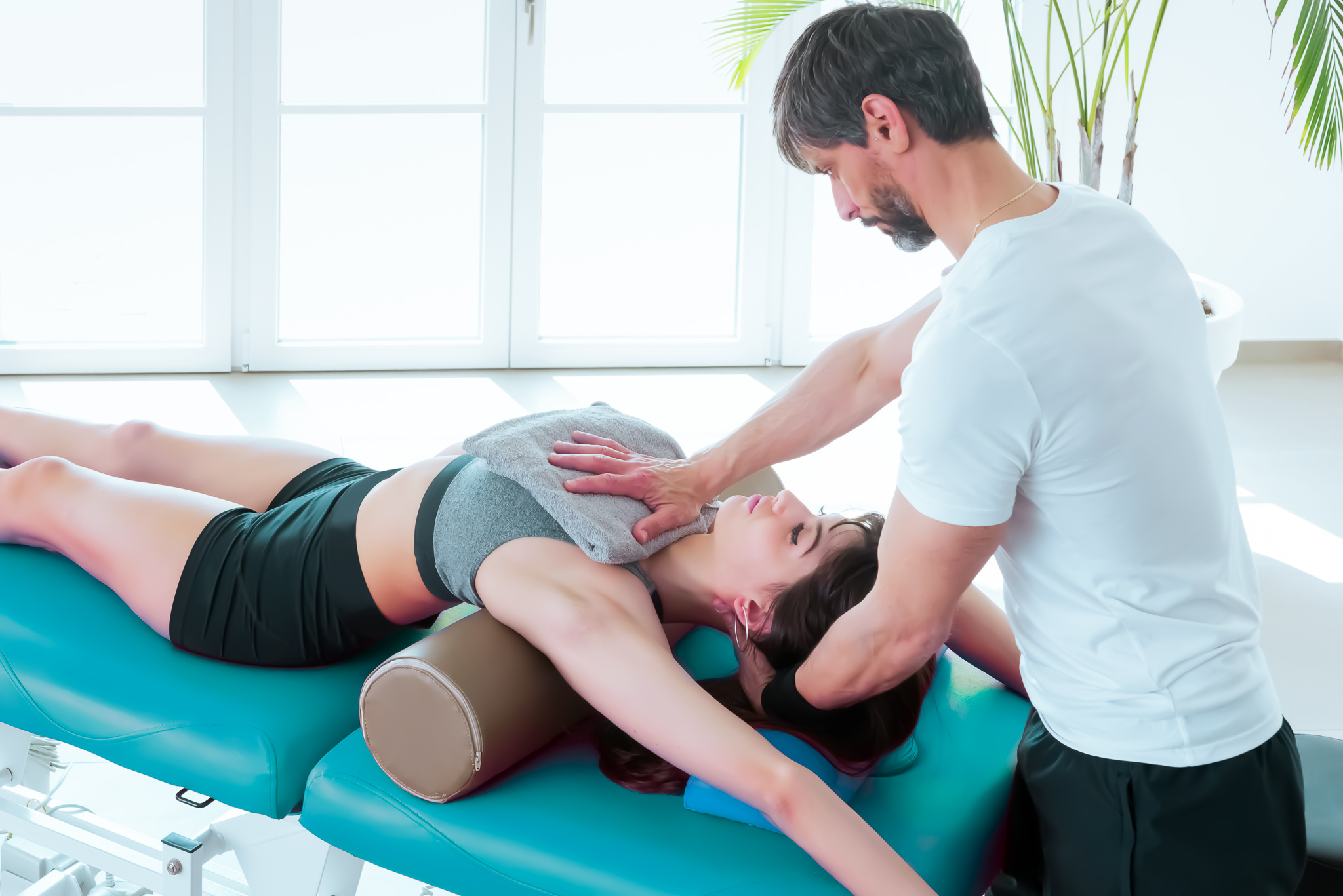Respiratory Physiotherapy
WHAT IS RESPIRATORY PHYSIOTHERAPY?
Respiratory physiotherapy is the discipline dedicated to improving and restoring adequate breathing when there is a respiratory difficulty.
Respiratory Rehabilitation contains basic pillars such as Respiratory Physiotherapy, muscle training and education about the disease, including nutritional and psychosocial support when necessary. The main tools used are the overall approach of respiratory muscle training and the body, in addition to appropriate techniques for drainage of respiratory secretions.
The objectives are:
- Avoid respiratory sequelae
- Encourage the drainage of nasal or bronchial secretions
- Work and re-educate the respiratory muscles
- Promote pharmacological treatment
- Promote self-control of breathing
For diseases or chronic respiratory problems, the goals are directed towards improving dyspnea (or feeling of lack of air), improving the quality of life related to the disease, and improving the capacity for effort.
At Clínica Eupnea Palamós, a specialized physiotherapist, together with the medical specialist, are the professionals who direct the therapy, help and supervise the patient, also evaluating the achievement of the goals set.
If you are looking for a respiratory physiotherapy professional in Palamós, do not hesitate to make an appointment with us.

BRIEF HISTORY OF RESPIRATORY PHYSIOTHERAPY

On this same website, the specialty of pneumology is presented as the most recent or new, chronologically speaking, recognized as such in 1977. Along these lines, it must be said that Respiratory Rehabilitation, which is the part of Rehabilitation (techniques and methods to recover a function or activity of the diseased organism) that focuses on respiratory conditions, has been developed very recently .
In 2000, the Spanish Society of Pulmonology (SEPAR) presented the first scientifically agreed regulations for rehabilitation and respiratory physiotherapy. During these years, the amount of knowledge and implications achieved have been of great magnitude. Thus, in 2013, it became necessary to publish a new update of the Respiratory Rehabilitation regulations.
WHY IS RESPIRATORY PHYSIOTHERAPY NECESSARY?
Respiratory pathologies lead to physical inactivity, since insufficient oxygenation and discomfort imply fatigue for the individual, as well as less mobilization without the person being aware of this reduced activity.
As for chronic problems, the progression and persistence over time of this lesser activity is synonymous with sedentarism, establishing a vicious loop between respiratory disease (with respiratory motor dysfunction and rib cage deformity) and physical deconditioning .
This progressive motor limitation occurs from the beginning and usually goes unnoticed until the disease is already quite advanced. The reason is that the individual gets used to the immobility and the lack of vitality, forgetting or losing over time the references of normality due to their daily physical activity.
It is known that physical inactivity is a factor with a poor survival prognosis and is related to a higher mortality, which is why respiratory rehabilitation should be addressed from the beginning or in the earliest phases of the diseases. Knowledge and dissemination of this treatment is necessary.
Another element to highlight, quite important for respiratory conditions, is the increase in respiratory secretions. They are usually frequent and appear as a cause of some symptoms such as coughing and expectoration, and complications such as retention of secretions, infections, mucus plugs, bronchiectasis, etc., which can last over time (even problems that they could be banal at first).
Respiratory physiotherapy knows and applies the techniques and roadmaps aimed at promoting the bronchial drainage of secretions, working on the respiratory muscles and their re-education, and promoting self-control of breathing. It is an exclusive complementary treatment, which cannot be replaced by a pharmacological treatment. Hence the importance of their role together with medical care and indication of the appropriate drugs.

Finally, it must be said that respiratory physiotherapy benefits both chronic diseases of the respiratory system (COPD, chronic bronchitis, asthma, bronchiectasis, cystic fibrosis, neuromuscular diseases, thoracic and vertebral deformities (scoliosis, kyphosis, pectum excavatum)), and processes acute (pneumonia, lung abscess, atelectasis, rib fractures or contusions…). Complements cardiac physiotherapy, self-care for diseases of the upper tract with improvement of nasal, pharynx and ear problems (nasal cleaning and irrigation, nasopharyngeal unobstruction, autogenous drainage…).
In the pediatric age, it favors the resolution of pathologies characteristic of this age such as bronchiolitis, in addition to all the conditions already explained, acute, chronic and of the upper respiratory tract, in the child. And it plays an important role in the prevention of surgical complications and improvement of the postoperative period of thoracic, thoraco-abdominal and cardiac interventions.
What is respiratory physiotherapy?
- Respiratory physiotherapy is a branch of physiotherapy that focuses on treating respiratory problems such as bronchitis, asthma, or pulmonary fibrosis through breathing exercises and clearance techniques.
What respiratory problems can be treated with respiratory physiotherapy?
- Respiratory physiotherapy can treat issues like chronic bronchitis, COPD, pulmonary fibrosis, atelectasis, among others.
What happens during a respiratory physiotherapy session?
- During a session, the physiotherapist may perform breathing exercises, cough techniques, chest massage, and other exercises to improve respiratory function.
What are the benefits of respiratory physiotherapy?
- Benefits include improved lung function, mucus clearance, increased exercise capacity, and overall improved quality of life.
When should I seek respiratory physiotherapy help?
- You should seek help if you have difficulty breathing, persistent cough, excessive mucus, or if you suffer from any chronic respiratory condition.
What home tips can I follow to improve my breathing?
- You can follow tips like doing deep breathing exercises, staying active, avoiding smoke and other pollutants, and staying hydrated.
Is respiratory physiotherapy painful?
- Typically, respiratory physiotherapy is not painful. The physiotherapist will adjust techniques to your comfort level.